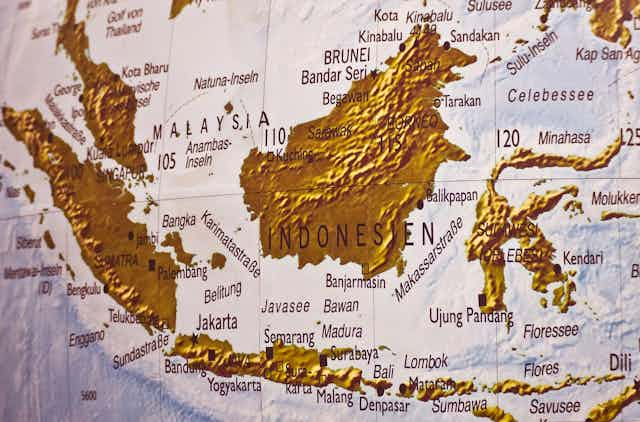It has been five years since Indonesia’s president Joko Widodo announced his vision to make Indonesia a global maritime power. Under a “global maritime fulcrum” doctrine he hoped to speed up the country’s efforts to integrate land and sea resources to increase the country’s welfare. However, not much progress has been made.
It’s important for the nation to improve connectivity between its islands, to close the inequality gap between Java and other islands. Additionally, without power over its seas and influence over surrounding areas Indonesia risks of being a target of global capitalism expansion and exploitation.
Research that I did with my colleagues, published in Marine Policy in October 2019, looked at why the Indonesian government has failed to develop the country as maritime state.
We found that the government focused more on building things, such as roads, bridges, ports, but neglected supporting people and businesses to increase their productivity to produce goods and services.

To get back on track towards becoming a maritime power, Indonesia should revitalise its maritime culture, which historically had been practised by ancient kingdoms in Java and Sumatra.
Indonesia should develop maritime technology and integrate land- and sea-based economies. The first would include aviation and satellite technologies. The latter underlines strengthening both terrestrial and seas resources for economic growth.
An unfulfilled vision
Jokowi failed in his first term to transform Indonesia as a maritime hub for at least three reasons:
1. US-China Trade War impact on China’s investment in Indonesia
Part of Jokowi’s strategy to become a maritime power is building ports and sea tolls to increase sea connectivity between islands in Indonesia and with other countries.
But construction of these maritime infrastructure has been delayed or slowed down due to lack of investments, especially from China – currently occupied with its trade war with the US.
Meanwhile, private sector participation to finance infrastructure development in Indonesia remains low.
2. Untapped potential in fisheries industry
Indonesia has yet to produce high-quality seafood exports to cater for international market needs. It remains unable to make use its potential – both human and natural resources – to support the maritime economy.
3. Declining capacity to build and develop modern sea vessels
During the Early Modern era (1450-1750), Indonesia’s traditional shipbuilders were already making ships. During Modern times in the 1900s, the state-owned company tasked with manufacturing ships for wars and commercial use, PT PAL Indonesia, was known internationally.
However, its global status has been declining since 1997-98, during the country’s financial crisis.
It managed to get back on track under Jokowi’s administration, which invested around 150 billion Rupiah for production and marine technologies. In addition, the company had managed to sign contracts with other countries and international companies to built warships, such as Strategic Sealift Vessel (SSV), tankers, passenger ferries, to power plant ships.
Nevertheless, the company still needs reliable workforce, as well as support of funding and innovation to respond to global development.
The path to becoming a maritime power
With a second term in office, Jokowi still has a chance to work on his global maritime fulcrum plan. Apart from building maritime infrastructure, the government should invest in advanced technology, and integrate its land- and sea-based economies.
1. Invest in advanced technology
Jokowi needs to advance the country’s aviation and satellite technology to support the role of major player in global shipping and trading. Having numerous sea vessels either for security or commerce will not mean much without the support of airpower and satellites.
There are promising developments. Recently the government said it will invest US$1.1 billion in airpower technology.
2. Integrate land and sea for economic growth
If Indonesia wants to become a global maritime fulcrum, it needs to integrate economies between the hinterlands and coastal areas.
Regions in the country, which equipped with modern ports and have connection to hinterlands, need to create certain economic policy structures, such as maximising sea ports to transport all hinterland’s commodities including vegetables, fruits, meats, and so on.
The government can design a special policy to make it easier, faster, effective, and efficient to be transported. All is to meet its own domestic consumption needs. This way, regions will develop their supply and demand, which would lead to the mechanism of an independent national market.
The move will also help Indonesia in the face of short term market downturns and global economic crises. Furthermore, this will significantly develop maritime economy which mainly utilise regional potentials.
Reviving Indonesia’s maritime culture
Historically, two major kingdoms, Srivijaya (now Palembang region of South Sumatra province) and Majapahit (now East Java province), became maritime powers in the 650s and 1200s-1500s, respectively, as they began trading with kingdoms in China via oceans.
They mastered the skills of trade and seafaring and initiated the Spice Route, which linked the East with the West, consequently being economically independent.
Even today, some Indonesians still identify themselves as seafarers with maritime knowledge, formidable shipbuilders, and accomplished sea traders.
But, we are still far from the Srivijaya and Majapahit’s maritime glory. It is the state’s responsibility to revive this maritime culture, so Indonesia can again become major players in the global maritime network, not objects.


